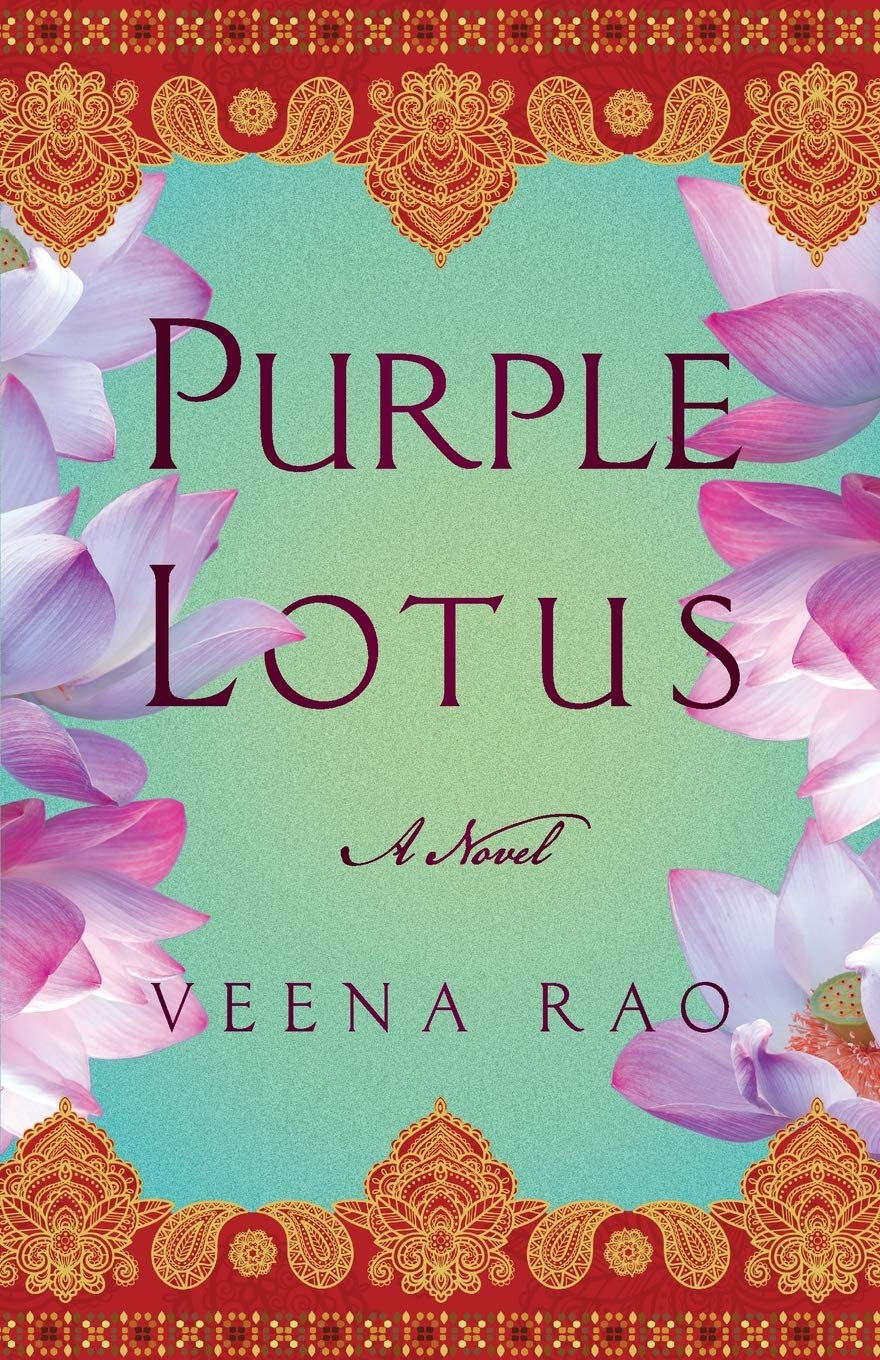I have an image of two women. One walks down a path with strong, bold strides, taking in everything around her. There seems to be no obstacle. The other is walking through a path overgrown with vines above and weeds below. Sometimes, the path isn’t even visible. There are unfamiliar sounds. The woman pauses now and then, weary, bewildered. And then, she summons her resolve and steps through the jungle. The road ahead looks lonely, frightening. She continues to step forward. When she finally emerges out of the desolation, the light seems brighter. Her freedom has been hard won.
Tara, the narrator of Veena Rao’s debut novel Purple Lotus, is the second woman. With an aching familiarity, Rao captures Tara’s struggle to shed the yoke of tradition.

We meet Tara when she is a little girl, playing with a doll, and follow her life through her childhood in Mangalore, India, in a traditional, patriarchal family. The losses start early, with the disappearance of the beloved doll. Then, she is left behind with her grandparents and an uncle, affectionate but schizophrenic, as her parents and brother move to Dubai where her father has found employment. After some years, they return, and she gets the reunion she has longed for.
We see Tara grow, form her teen friendships, pine for a crush. In some years, her marriage is arranged to Sanjay, an engineer working in America. After they are married, he returns to the U.S. and is barely in contact for three long years. Finally, he sends for her, and she leaves India to join him in the American South. The descriptions of jet lag will ring true to anyone who has ever been a weary traveler, the disorientation, the loneliness, the feelings of being lost in a new place. Over Tara’s every action, there is a gray cloud that obscures the sun. The path is never clear, never unfettered.
The writing is simple and the story pulls you along in this page-turner of a novel. Incidents from the past are interspersed with the present, and I enjoyed the structure and non-linear narrative. While Alka Joshi‘s book The Henna Artist (which I reviewed here), also about a woman forging her path to independence, is lush with descriptions, bringing alive the physical surroundings, what linger more in Purple Lotus are feelings. A pervasive melancholy, a feeling of loss, a struggle to overcome. These feelings are punctuated by moments of comfort, friendship. As in most cases when a woman is struggling, it is the sisterhood that comes through. Alonya, the neighbor who keeps her company, takes her to a thrift store so she can buy a coat as it starts getting colder, who finds her a job. Ruth and Dottie who give her shelter, sustenance. The women in her vocational training class with whom she enjoys lunches at a nearby Indian mall, the ones who encourage her to take on an unexpected modeling gig. Rao captures well the vulnerability of a new immigrant who has arrived here through marriage, the risks posed by the imbalance of power, and the progression to domestic violence. Tara’s husband is aloof, and pushes her away as she attempts to come closer. When the wall seems unbreachable, she leaves. Then the pleas to return to him. Promises of better behavior. The violence to reestablish control. Finally, she leaves for good. Many women don’t make it out. October is National Domestic Violence Awareness Month, and Tara's story is particularly relevant. Organizations such as Narika and Maitri here in the San Francisco Bay Area are critical in providing avenues, tools and shelter for helpless, voiceless, immigrant women to make their way out of the danger of domestic violence.
There is a sense of foreboding from the moment Tara enters the residence of the man she has married. Sanjay may have his own demons, but we don’t get much of his backstory. The author offers us little understanding of his individual choices, infusing the narrative instead with his aloofness, harshness and hateful words. There seems to be little, if anything, that redeems him. In contrast, Cyrus, Tara's childhood friend, is a joyous presence. The narrative lightens when he arrives. His disarming ways bring humor, laughter and love into Tara’s life. They build a life together and find joy and meaning in social causes. But the weight of tradition does not lift off so easily. There must be a personal reckoning, confrontation and overthrowing of oppressive ways, both within and without. Held hostage by her own demons, Tara journeys back to her parents’ house. The conversations with her family are not easy: the weight of tradition looms heavy, and the expectations of a woman, honed over decades, even centuries, stand in her way. After all, she walked out of a marriage, and naturally, she must be to blame. There are pleasant revelations: the loss of the doll is explained. A childhood friend comes back into her life. Through the upheaval and pain, Tara finds herself.
This review was published in India West on October 22, 2020
Comments